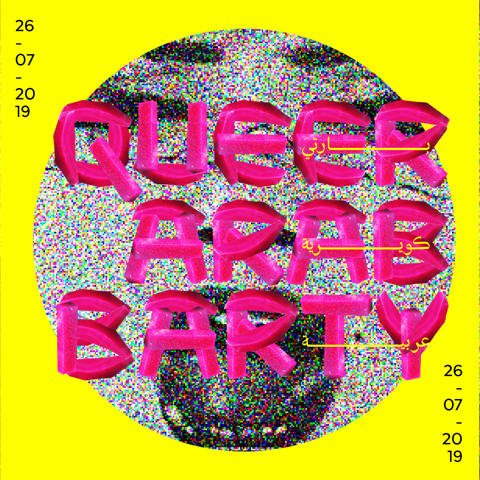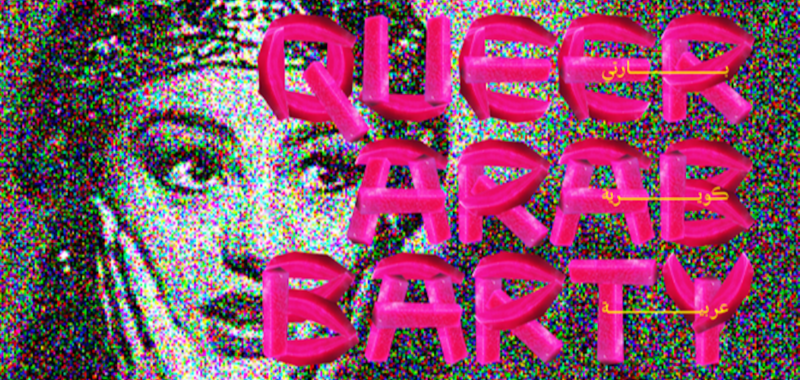Queer life is an integral part of Berlin’s culture: parties, conferences, media coverage. But how open is the city for people of Arabic origins? The initiators of Queer Arab Barty write on queer-Arab sense of belonging and identity.
Erkan Affan and Nael Ibrahim write for Jeem and Wir Machen Das about the necessity of creating Queer Arab Spaces in Berlin.
It is not rare to walk into a space that has been graced with the wonderful presence of queer and trans people from the Arabic-speaking world and feel an intense energy of excitement, openness and emotional generosity. It is embedded within our various cultures and traditions that exist across a region connected through a common spoken tongue. Our histories are ones that are rich with loveable divas, shady interactions, captivating dramatic discourses, and a total and utter resilience towards queer silencing in mainstream societies; embodying vernacular expressions and creative tropes that leave others with their brows furrowed and their faces full of fascination (and incomprehension).
But spaces in which we can perform and embody ourselves, where our cultural productions and communities can project such a beautiful feeling of liberty and freedom, are not offered to us for free. We don’t wake up one morning, be it in Beirut or Berlin, with the template of an accessible social architecture and physical space being readily available for us to engage in; to belong in. Rather, we continue to fight for these spaces – navigating whiteness, straightness, cis-centrism, Eurocentrism, Orientalism, racism and many other forms of bigotry – in order to even come close to (re)creating communities in which we, as queer people from the Arabic-speaking world, can feel as though we matter.
Take Christopher Street Day (CSD) in Berlin as an example. The largest, city-endorsed parade with distinctive international sponsors, CSD is an event that without fail manages to ceremonially exemplify the marginality that queer, trans* black and brown people feel exposed to on a regular basis in the city. During my brief attendance last year (as a gender non-conforming queer Arab*), I watched how white, cisgender masculinity was pedestalised as the ultimate sexual symbol on the numerous floats passing through the street – leaving the rest of us, the non-white, non-cis and non-German – feeling like nothing more than bollards between the pavement and the parade. I particularly remember one trans, Persian-German sister of mine shouting about the importance of keeping pride events as political protests in the spirit of Marsha P. Johnson; she was met with nothing more than a mocking laugh, further exemplifying our invisibility as ‘other’ communities.
So there is a need for us to create our own space, that much is clear. The spaces that are available for us as Arabs and Queers in Berlin are already numbered, and not without their own tensions and complexities – between political affinities and cultural tendencies, we are frozen in a space-time with marginal opportunity to navigate social, cultural and personal convolutions on both individual and communal levels. But the spaces that are available for us to perform our queerness and Arabness in a harmonious manner always sway towards a thematic narrative of aesthetic performativity and cultural fetishization, ignoring the deeper rooted issues of community rejection, the fear of ‘outing’, and the lack of safe spaces that we as queer Arabs are always fighting against. In short, queer Arabs are left in between a rock and a hard place: we’re too Arab to be queer, and too queer to be Arab.
If Berlin has proven to be anything it is indeed that it is very queer, but for whom is this queerness curated?
This (ficitious) binary of ‘Arab versus queer’ not only reduces our lives, experiences and our backgrounds into two categorial identities that erase our ethnic, religious and linguistic diversities however, but it also prevents us from feeling like we belong in this city. How can Berlin become home if its spaces are not made readily available for all of our identities, rather than just a segment of them? After all, queer visibility is not tough to come across in Berlin. From media representation and workshops to parties and conferences, if Berlin has proven to be anything it is indeed that it is very queer, but for whom is this queerness curated?
Somehow however, this exclusion seems to spare our hummus and falafel, our belly-dancing and our brown bodies. Queer Arabs are openly transformed on stages across the city – hosted by a number of people with varying backgrounds and positionalities – into Jasmine, Aladdin and all the other characters of Arabian Nights, whilst our existences here are still conditioned with little respite. So it appears that this society tentatively decides what is digestible and disposes of the rest, as if to say that our queerness is only valid if we can produce an ‘orientalised’ kind of Arab. Surprised? You shouldn’t be. Whilst anti-refugee sentiments are increasing, a report by ZEIT ONLINE last year showed “refugee pornography has become virulent in Germany since 2015”.
A simple name with a simple goal: self-expression and acceptance.
We need spaces in which we are not a fetish. Where our identities are not a performance. Where we can live and breathe in our authentic manner, comfortable with who we are and choose to love and be loved by. Where our sexuality and our gender is not hegemonically perceived, studied, analysed, sensationalised and commodified. When I get off the U-Bahn and walk towards the club with my large neon earrings that read ‘Habibi’, my off-the-shoulder outfit that exposes my bare skin and leaves me feeling vulnerable in public, I want to know that I am walking in to a space where my visibility will not lead to my demise, only to my authentic self-expression.
This is what we intend to do with Queer Arab Barty. A simple name with a simple goal: self-expression and acceptance. This attempt for us to carve a new space for queer Arabs in Berlin is not one that endeavours to divest from other queer spaces in the city, but rather to show how queer spaces should be: no one should be uncomfortable, discriminated against, touched or kicked out for who they are. So we, a collective of queer diaspora Arabs, are claiming a space in which we can claim ourselves. The constant fight to enjoy our bodies and let our goals roam in this city is exhausting, and we too deserve spaces that are inclusive, pleasurable, relatable and above all safe. We need to be able to walk into a bar, a café, a späti, a restaurant and not feel scared because of our background, our politics, or our status in this country. Carving out these spaces for ourselves is an attempt to reclaim the city that we all came to/were brought to, by our own volition or out of necessity; where we could be both queer and Arab and never have to think twice about it.


Add new comment